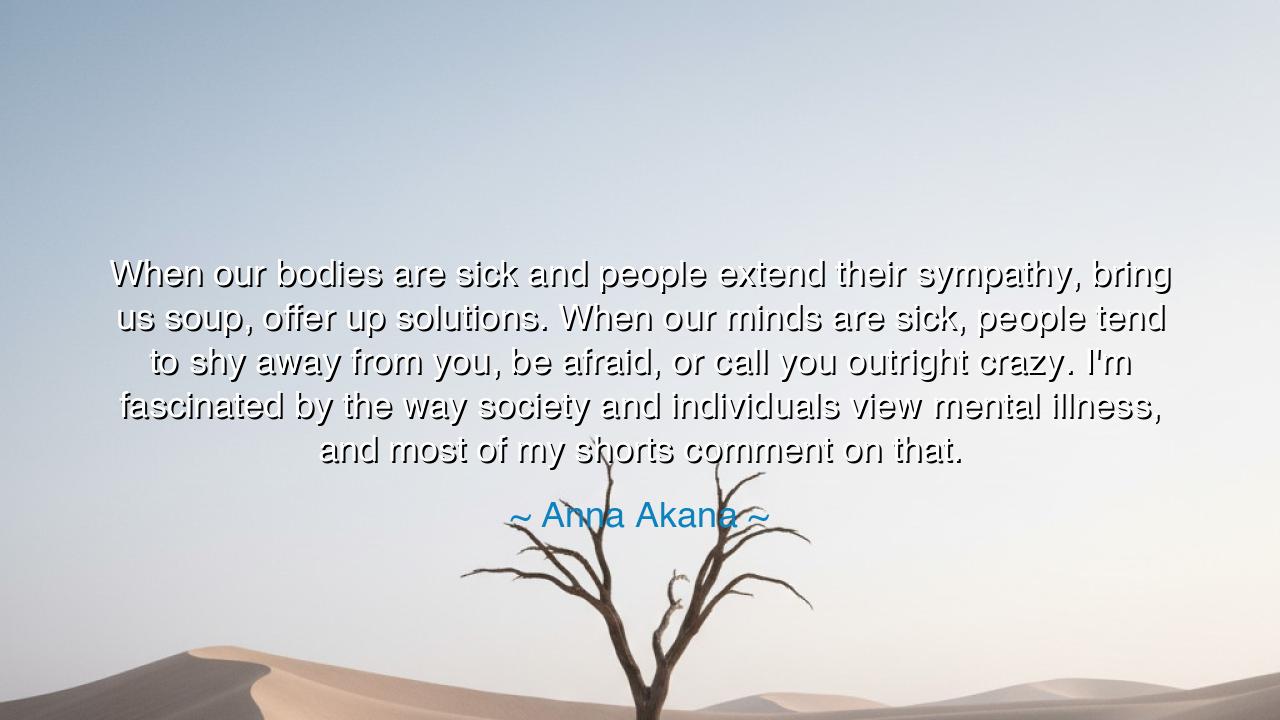
When our bodies are sick and people extend their sympathy, bring
When our bodies are sick and people extend their sympathy, bring us soup, offer up solutions. When our minds are sick, people tend to shy away from you, be afraid, or call you outright crazy. I'm fascinated by the way society and individuals view mental illness, and most of my shorts comment on that.






Hear, O seekers of truth, the voice of Anna Akana, who speaks with courage on the hidden wounds of the spirit. She declares: “When our bodies are sick and people extend their sympathy, bring us soup, offer up solutions. When our minds are sick, people tend to shy away from you, be afraid, or call you outright crazy. I’m fascinated by the way society and individuals view mental illness, and most of my shorts comment on that.” In these words, she reveals a rift in the human heart: our willingness to comfort the illnesses we can see, and our fear of those we cannot.
For when the body falters, the world responds with care. Neighbors bring food, families gather, even strangers lend a hand, for physical sickness is a burden all understand. It has weight, it has form, it can be named and measured. But when the mind falters—when sorrow, despair, or chaos dwells within—the world recoils. Instead of comfort, there is avoidance. Instead of soup, there is silence. The sufferer becomes not a patient, but an outcast. Thus Anna speaks of the hypocrisy of sympathy, which too often is given only to the wounds visible to the eye.
This truth is not new. History is heavy with the mistreatment of those burdened by the unseen storms of the mind. In ancient times, those with epilepsy or madness were thought possessed, cast out of cities, or chained in darkness. Even in the age of reason, the mentally ill were hidden in asylums, feared and forgotten. Yet, alongside this cruelty, there have always been voices of compassion. Recall Dorothea Dix, the reformer of the 19th century, who devoted her life to demanding humane treatment for the mentally ill. Where others saw madness, she saw suffering. Where others recoiled, she drew near. In her actions we see the very sympathy that Anna Akana longs for in our own age.
The meaning of Anna’s words, then, is not only to name society’s failure, but to call us back to our shared humanity. For the mind is not separate from the body; both are fragile vessels of the soul. If we can bring bread to the sickbed, why can we not also bring compassion to the one weighed down by depression? If we can accept the brokenness of flesh, why do we deny the brokenness of thought? The wound of the mind may be invisible, but its pain is no less real.
Consider also that some of the greatest lights of history bore such inner storms. Abraham Lincoln, tormented by melancholy, yet carried a nation through civil war. Vincent van Gogh, consumed by despair, painted the heavens with eternal color. Virginia Woolf, though undone by her illness, reshaped the very language of literature. Their struggles remind us that what society fears as weakness may also harbor profound strength. To dismiss those who suffer in mind is to risk dismissing the very souls who might gift the world with greatness.
The lesson, O listener, is urgent: learn to extend sympathy not only to the body, but to the mind. When a friend withdraws into silence, do not abandon them—sit beside them. When a loved one wrestles with invisible pain, do not call them weak—walk with them. Just as you would offer soup to the fevered, offer presence, patience, and compassion to the anxious, the sorrowful, the weary of spirit. For the greatest healing is not always found in cures, but in the knowledge that one is not alone.
So let Anna Akana’s words guide you: challenge the fear that makes society recoil, and become a source of courage and care for those who suffer in silence. Speak openly, listen deeply, and treat mental illness not as shame, but as part of the human condition. In doing so, you will not only help to heal others—you will also help to heal the world of its greatest blindness: the failure to see the suffering of the mind as equal to the suffering of the body.
And thus the teaching endures: let sympathy be whole, not partial; let compassion be extended to every wound, seen and unseen. For when we honor both body and mind with equal care, then humanity will truly live as one family, carrying each other’s burdens with love.






AAdministratorAdministrator
Welcome, honored guests. Please leave a comment, we will respond soon